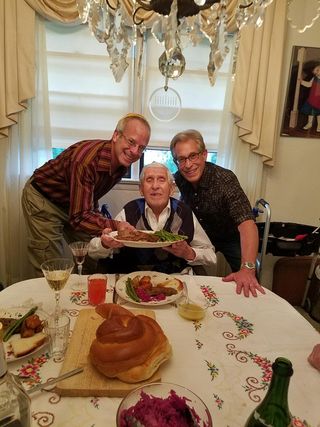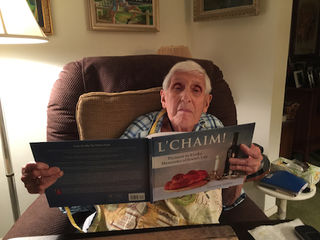Traumatic Brain Injury
Hospital Madness & Farewell Dad
The headline wasn't comforting: 'Medical Errors 3rd Leading Cause of Death'
Posted November 28, 2016

I didn’t find this headline very comforting: “Medical Errors 3rd Leading Cause of Death,” but I did find it very easy to believe. We had brought Dad to the ER with a chronic, night-time, wheezing cough, barely able to come up for air, and a very assuring cardiologist informed us with great confidence and authority, “I am one-hundred percent certain that this is not a cardiac issue.”
Later, following a clear chest x-ray and unremarkable c-t scan of his lungs, the Head Pulmonologist informed us, with equal certainty, “This has nothing to do with his lungs; it’s definitely a cardiac problem.”
Great; any other ideas?
- His PCP conjectured that he had a sudden case, at 92, of GERD—acid reflux—and prescribed Nexium.
- The hospital speech therapist administered a swallow test and concluded he was most likely aspirating food, causing the cough, just not enough to show up as aspirational pneumonia on the scans.
- A second cardiologist declared he most likely had had a “silent heart attack”— the kind that don’t make any noise, I guess—several months back. When I told him that his colleague was “one-hundred percent certain this wasn’t a cardiac issue,” he responded with a roll of his eyes, and said, “Well, I would be considerably less certain than that.”
- A third member of the cardiology team, who we later learned was a “Fellow”—and a jolly good one, at that—spent forty minutes enthusiastically, even gleefully, describing the procedure he intended to perform the next morning, coming up through Dad’s groin with a catheter, merely to look around in his heart, possibly to install a stent if he discovered any blockages, but mostly to scout the terrain for a valve replacement to follow several weeks later.
“Fellows” need to practice their surgical skills and gain experience, so tend to push for these things. Fortunately, the more he spoke, the more he observed Dad coughing his head off in the bed, while also growing belligerent and angry because everyone was ignoring his request to help him get to the bathroom. “Of course,” the Fellow remarked, changing his tune from eager to hesitant, “Your father would have to be able to lie flat, cooperate, and not cough for several hours.” Oops. “And you would also have to remove his DNR or we won’t do any procedures on him at all.”
Oh. So we were supposed to delete/undo my father’s stated wishes, made when he was of sound mind, which sort of defeats the whole purpose of an “Advanced Directive,” and it would be in order to do a procedure that we learned carried the risk of stroke, heart attack and death. In addition to which, my father had suffered from a Traumatic Brain Injury, a mini-stroke and a major seizure in the previous three years, and even a minor cold had a noticeable and rather instant impact on his cognitive status and confusion levels. Imagine what a surgical procedure would do to a 92-year-old with those conditions? We said no.

Thankfully, Marcus Welby finally showed up. The older/wiser Head of Cardiology came to meet us and, to our surprise and relief, totally agreed with our decision not to do any invasive procedures, for all of the above reasons, in addition to the following, which was rather eye-opening:
“We really have no idea if his heart has anything to do with his coughing fits, nor if the procedure would help in the slightest.”
Hmmm….now that was really food for thought.
We noticed that when the EMTs had arrived at the house at one in the morning and placed an oxygen mask on my father, his five-hour coughing fit stopped instantly. We concluded that getting discharged with at-home oxygen might be a good idea.
Easier said than done. His saturation levels in the hospital, having been on oxygen non-stop for several days, were well above the levels that would qualify him for at-home oxygen. Fortunately we had discovered a little-known secret about most hospitals and doctors, from our own experience as patients: they will essentially do anything you ask, relieving them of the burden of making recommendations and decisions. (I have literally been my own chief prescriber of medications for years.)

In this case, my brother, a Ph.D. in psychology, had earlier made a phone call to the Attending Physician on my father’s floor—a man we had met for all of 30 seconds the previous day and never laid eyes on again—and said, “This is Dr. Harry Sobel, I would like to order an IV antibiotic for my father in Room 4487,” to which the Attending responded, “Yes, yes, right away, I will call it in immediately.”
Harry then proceeded to be creative with my Dad’s oxygen numbers such that we were able to get him discharged with the oxygen approved. But the real kicker was when he approached the Nursing Station to make a simple request about getting Dad cleaned up and changed, and was informed that,
“There is no Max Sobel registered on this floor. He is not here.”
My brother replied, “My father is two doors down, in Room 4887.”
The nurse said, “No I’m very sorry, sir, but your father is definitely not on this floor.”
Interesting. So who was that guy in our father's bed? He was a dead-ringer for our Dad. Meanwhile, we wondered what other medications we could order for this non-existent patient while we had access. Perhaps I could score some oxycodone?
Thankfully, we got Dad home, with oxygen, in one piece, his symptoms abated.
“Medical Errors Are 3rd Leading Cause of Death”?
What a shocker.

I wrote the above account last spring. My beloved father passed away at home a few weeks ago, in his own bedroom of 60 years, with my brother and me at his side, some six months following that episode, and about a month shy of his 70th wedding anniversary. (Mom is still home, albeit 17 years into Alzheimer's and oblivious to this world. We wheeled her to Dad's bedside right after he passed and placed their hands together and told her he was gone, on the off-chance that it might register in some deeply unconscious corner of her soul; we'll never know.)
At the very end, my father suffered with difficulty breathing for about 45 minutes before a small amount of morphine kicked in and allowed him to calm down and drift peacefully away. We love you so much Dad, and will miss you forever.
(Oh, and by the way, Dad, you were summoned to jury duty yesterday; if I were you, I would just blow it off.)
Eliezer Sobel has just published the first book ever designed for Jewish people with Alzheimer's or dementia: "L'Chaim: Pictures To Evoke Memories of Jewish Life."





